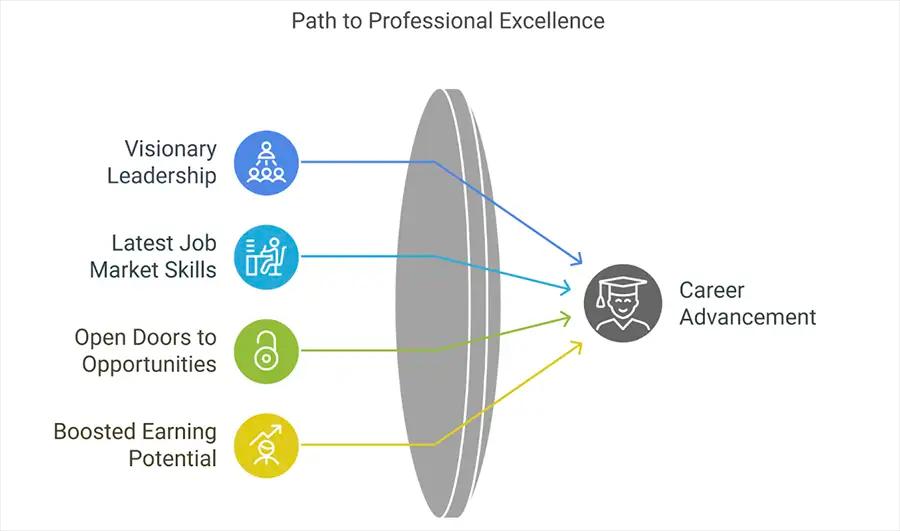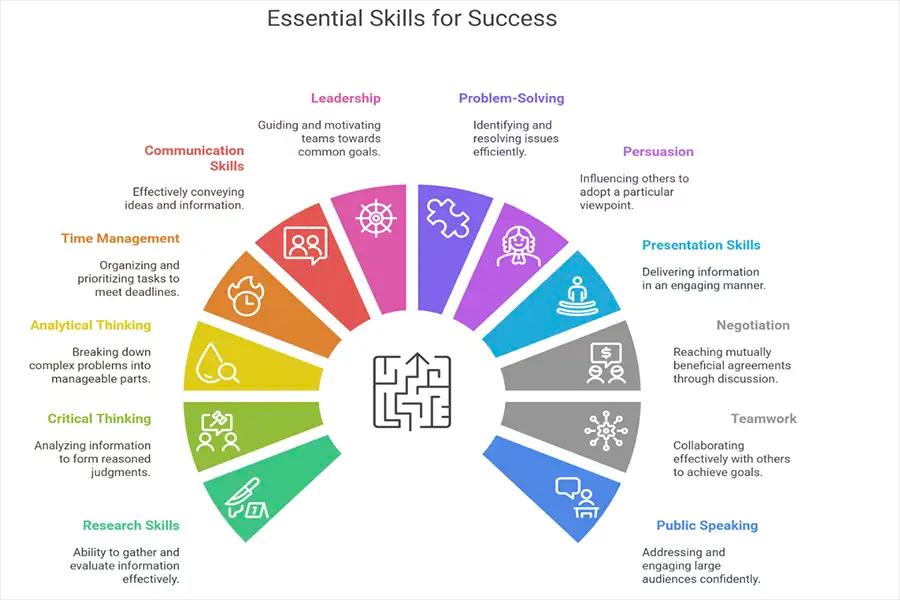Explore Courses
Top University

Jagpreet
18 June, 2025
Table of Contents
Having a graduate degree professionally may not be that rewarding in today’s time. It is important to pursue your education further if you are looking to build a successful career. If you are someone looking to build a career that not only is professionally lucrative but also benefits in terms of personal development, an MBA can be the right postgraduate degree for you. And yes, after pursuing a BA at bachelor’s level, you can continue along the management path and advance your professional standing.
One can also transition from an arts background to business management with enhanced skills today, just by pursuing an MBA. From BA to MBA in Finance and Banking or other specialisations, one can easily chart a career trajectory that would earn management learners endless professional opportunities, high-paying jobs and enhanced knowledge of the industry.
In this blog, we will discuss the prospects of pursuing an MBA after a BA, including career benefits, eligibility criteria, admission process, and more. If you are looking for scholarships and career aspects with salaries, explore with Learning Routes to open the doors of opportunities.
There are multiple benefits of doing an MBA after a BA; one of the most significant reasons is that an MBA degree. MBA after BA is a smart choice for graduates aiming to enhance their career growth. Here are additional reasons to consider doing an MBA after a BA. Some of the top benefits of an MBA after a BA are listed below:
Take the reins of your career. An MBA will open the doors of multiple job roles and industries for you. After an MBA, you can apply for jobs in different sectors, including IT, finance, HR, and more. The career advancement path for a BA graduate after completing an MBA is filled with multiple opportunities. One of the most outstanding examples of career advancement after an MBA is that you can transition your career to any position you want, from working as a financial analyst to working as a project manager. The chances are high. The career potential rises post-MBA after a BA.
The MBA programme is not just a degree programme; it is filled with subjects, projects, workshops, and webinars to enhance your skills, including your problem-solving or analytical skills. An MBA programme will give you the ninja expertise to gear up with the latest skills for the job market requirements. Through the meticulous coursework, you would also get to enhance your soft and hard skills.
The scope of MBA after BA is vast, offering wide career paths. Break free from traditional career paths associated with your BA. An MBA opens doors to a vast array of exciting possibilities, allowing you to explore new fields and ignite your passion for business. There are multiple modes to complete an MBA after a BA. You can pursue an MBA while you work full-time or part-time.
An MBA is delivered in different modes. You select this based on your personal lifestyle, time schedule, work schedule, budget, and location. With the right specialisation, the scope of MBA after BA includes opportunities in startups, consulting firms, and even government sectors.
Here are some of the modes of delivery for an MBA programme across the nation, and who the ideal student is for each mode of delivery:
Part-time MBA: Working professionals, career changers and residents
Full-time MBA: Recent graduates, career accelerators, international students
Online MBA: Busy professionals, self-motivated learners, geographically remote students
Distance MBA: Remote workers, independent learners, cost-conscious students
One of the key benefits of MBA after BA is the ability to shift into various sectors. MBAs are highly valued credentials in the business world. Graduates often command significantly higher salaries than those with just a BA degree. Once you complete an MBA after a BA, you would be increasing your income to at least double what you could get after a BA.
For example:
BA Graduate Salary: The average salary for a BA graduate ranges from ₹2,00,000 to ₹5,00,000 per year.
MBA Graduate Salary: The average salary after an MBA in India ranges from ₹6,00,000 to ₹23,00,000 per year.
As you can see, the difference between the salaries is double-fold. This proves that an MBA after a BA can provide you with a higher salary package depending on your industry, experience, skills, university, and interests.
Are you still wondering why an MBA after a BA is a powerful move? Well, there’s more on the plate of an MBA. Here is why:

Now that we have covered the different aspects of an MBA after a BA, let’s take a look at the list to find out if you are fit for an MBA or not. Here is a quick list to find out if an MBA after a BA is the perfect fit for you:
The beauty of an MBA lies in its diverse specialisations. An MBA has multiple specialisation options; excitingly, you can also choose a dual specialisation course. Students pursuing an MBA after BA can choose fields like marketing, international business, HR, or operations to align with their interests and job market trends. One of the most crucial choices you need to make after a BA is to pick the right specialisation for an MBA. You can pick an MBA specialisation based on your:
Your Skills
Your Career Interest
Your Limited Budget
Your Location
The biggest question right now for you is, “Am I eligible?” Well, the BA degree has taught you tonnes of skills, including research, analysis, report writing and critical thinking. However, here are some of the eligibility criteria you need to tick to get admission to an MBA programme.
Here’s how to determine your eligibility for an MBA after a BA:
Make sure you have scanned copies of your ID card, passport, degree certificate, and any other documents requested by the universities you target.
Are you ready and eligible to apply for an MBA after a BA? If “yes, then here is your 10-easy-step guide on how to apply for an MBA programme
Research & Explore: Research the different MBA programmes you are interested in especially the specialisation that you want ahead.
Target Your Universities: Shortlist universities that offer the programmes you want and that fit your budget and location preferences.
Eligibility Check: Make sure you tick all the eligibility criteria
Entrance Exam Preparation: Start preparing for entrance exams (CAT, XAT, MAT, etc.)
Take the Exams: Schedule and take the required entrance exams.
Secure Recommendations: Request strong letters of recommendation from professors or past employers.
Craft a Compelling Personal Statement: Write a compelling personal statement that highlights your academic achievements, career aspirations, and unique value proposition.
Application Time: Carefully complete application forms for your chosen universities, ensuring accuracy and completeness.
Gather & Submit: Collect all necessary documents (transcripts, certificates, essays), pay the fees, and submit them with your applications.
Track Your Progress: Follow up with universities to confirm receipt of your application and monitor the selection process.
Pursuing an MBA after a BA offers more advantages than it may appear at first glance. If you have worked after a BA, then it would also count as a plus point in your favour for admission into some of the top B schools in the country. If you have worked in fields such as research, content creation, analysis, marketing management, or human resource management, it can greatly enhance your chances of being accepted into top business schools in your city.
Gaining work experience before pursuing an MBA is advantageous as it allows you to apply practical knowledge to your studies and highlight it on your CV. Many MBA programmes value applicants with professional experience, and several universities, including IIM Ahmedabad, ISB Hyderabad, INSEAD, the London Business School, Harvard Business School, and the Stanford Graduate School of Business, prefer candidates who have prior work experience before undertaking an MBA.
So, can you do an MBA after a BA? Yes! However, having relevant work experience from 1-3 years after a BA in history can also increase your chances of getting into a better MBA college.
If you want to check your skills for an MBA after a BA, then here are some essential skills that you might have already developed after a BA, which are necessary in the MBA programme:
| Skill | Complementary Skill |
|---|---|
| Research Skills | Critical Thinking |
| Analytical Thinking | Time Management |
| Communication Skills | Leadership |
| Problem-Solving | Persuasion |
| Presentation Skills | Negotiation |
| Teamwork | Public Speaking |

The cost of an MBA can be a hurdle, but don’t let it demotivate you. There are multiple ways you can fund your MBA programme. Some of the ways include various financial aids, fee waivers, and scholarships (private and Government) are available to help ease the burden:
Here are some top universities, institutions, and private organisations that provide scholarships for MBA students:
Aditya Birla Group Scholarship
T. Thomas Scholarship (IIM Ahmedabad)
IDFC FIRST Bank MBA Scholarship
IIM Ahmedabad MBA Scholarships
Merit Cum Means Scholarship for Professional and Technical Courses CS (Minorities)
IIMA Special Needs Scholarship (IIM Ahmedabad)
IMT EWS Scholarships
Central Sector Scheme of Scholarship
IIM Lucknow MBA Scholarship
BML Munjal University MBA Scholarship
Scholarship for SC/ST candidates (IIM Ahmedabad)
ONGC Scholarship
IIM Bangalore MBA Scholarships
NHFDC Scholarship
With experience, BA + MBA salary can grow significantly in roles like HR manager, marketing lead, or business analyst, etc. After completing an MBA following a BA, the average salary can range significantly depending on the job role, with potential earnings from ₹2,34,203 to ₹9,25,912 per year. Also, with experience over the years, in-demand fields can push the BA + MBA salary much higher within a few years.
| Job Role | Average Annual Salary Range (INR) |
|---|---|
| Financial Planning and Analysis Manager | INR 9.3–40 LPA |
| Product Manager | INR 5.7–13.1 LPA |
| General Manager | INR 6–60 LPA |
| Merger and Acquisition Manager | INR 3.4–14.4 LPA |
| Management Consultant | INR 7–13.4 LPA |
| Analyst | INR 2.1–13.6 LPA |
| Information Systems Manager | INR 3.4–14.4 LPA |
| Public Relations Manager | INR 2.2–14 LPA |
| Marketing Executive | INR 3.1–6.5 LPA |
Opting for an MBA after a BA is an ideal choice for you if you are looking to enhance your career, change your career path, double your average salary package, and get leadership job roles. An MBA programme includes practical learning of the real-life business and management world where theory meets practical reality. It is now your chance to take your career into a better world of opportunities. An MBA after a BA is the trend in the job market. Take your notebook and start listing your dream B schools today! Tick Tick!
You can pursue an MBA after completing your BA degree. You need to check the eligibility for your dream business university to enroll for an MBA after a BA.
The top trending MBA specialisations are healthcare, finance, banking, marketing, HRM, and information technology.
After you complete an MBA, your salary can go from 2 LPA to 10 LPA on average. This shows that an MBA can increase your salary package.
Yes, you can go for a specialisation in human resource management MBA after a BA. You should be eligible for a passing degree from a recognised college and pass an entrance test required by the university.
Yes, you can go for MBA after BA and work professionally as a marketing manager, PR manager, advertiser, etc.
Our team of experts, or experienced individuals, will answer it over online meet. Book your slot now!
Book Free Online CounsellingGet Free Career Guidance
